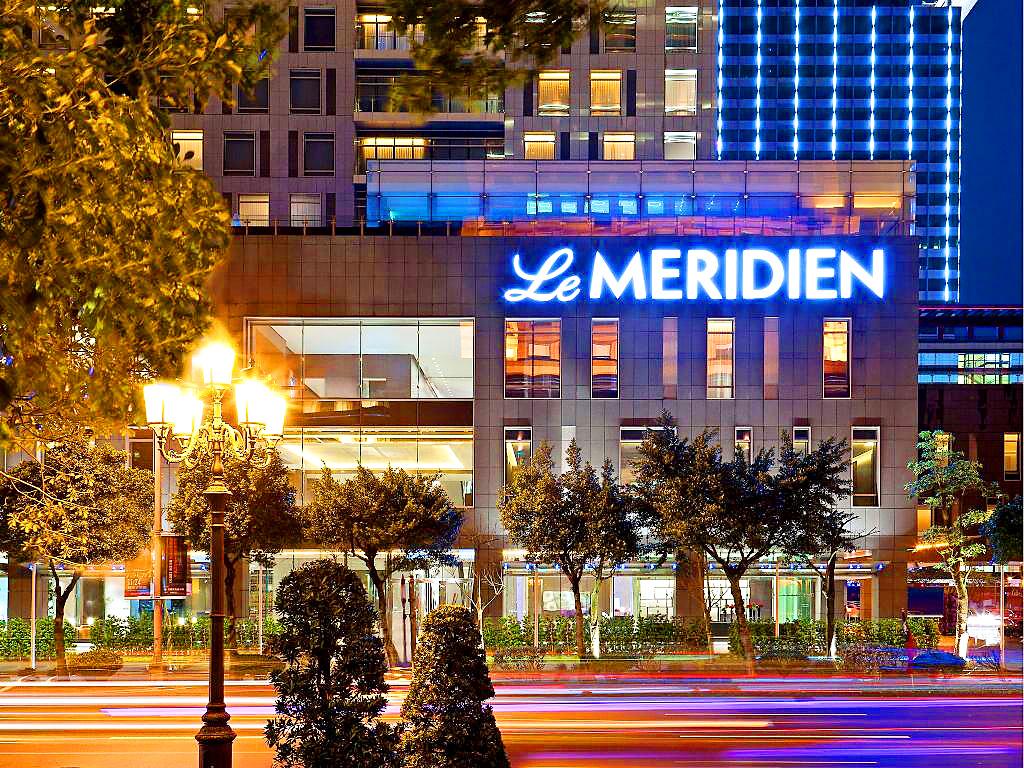The board of luxury hotel operator My Humble House Hospitality Management Consulting Co (寒舍餐旅) has approved a capital reduction plan to wipe out losses and issue special shares via private placements to strengthen its financial health.
The plan comes as the COVID-19 pandemic has cut the Taipei-based hospitality group’s revenue by about 50 percent over the past two years without a quick solution in sight.
The company last year reported a loss of NT$720 million (US$24.67 million), or a loss per share of NT$6.45.

Photo courtesy of ezTravel Co
It was the second consecutive annual loss as Le Meridien Taipei (台北寒舍艾美酒店) and Humble House Taipei (寒舍艾麗) in the city’s Xinyi District (信義), Sheraton Grand Taipei Hotel (台北喜來登大飯店) near Taipei Railway Station and hot spring resort Mu Jiaosi Hotel (礁溪寒沐) in Yilan County all suffered due to lingering border controls and disease prevention measures that weighed on guestroom operations as well as food and beverage sales, the company said.
Combined revenue in 2019 was NT$4.48 billion in 2019 prior to the pandemic, but that slumped to NT$2.8 billion in 2020 and NT$2.32 billion last year, company data showed.
The company’s board on Friday approved a plan to reduce its paid-in capital of NT$1.12 billion by 18 percent, or NT$200 million, to make up for cumulative losses.
The arrangement would allow May Humble House Hospitality to cancel 2 million common shares and bring its capital down to NT$915 million, it said.
The conglomerate would then issue up to NT$200 million of special shares via private placements to boost its capital, it added.
The program would help lower the company’s debt ratio and interest payments, while strengthening operating funds and earnings ability, it said.
My Humble House said it would price its special shares at no less than 80 percent of its reasonable value to safeguard the interests of its shareholders.
It opted for private placements after factoring in fundraising costs, efficiency and feasibility, it said, adding that potential participants are original major shareholders and affiliated companies.
The launch of a new Humble Boutique Hotel (寒居酒店) in Taipei demonstrated that the group is committed to its business and upbeat about the long-term market outlook, it added.
My Humble House shares yesterday closed down 1.34 percent at NT$22.10, a deeper fall than the TAIEX’s 0.62 percent retreat, Taiwan Stock Exchange data showed.

RUN IT BACK: A succesful first project working with hyperscalers to design chips encouraged MediaTek to start a second project, aiming to hit stride in 2028 MediaTek Inc (聯發科), the world’s biggest smartphone chip supplier, yesterday said it is engaging a second hyperscaler to help design artificial intelligence (AI) accelerators used in data centers following a similar project expected to generate revenue streams soon. The first AI accelerator project is to bring in US$1 billion revenue next year and several billion US dollars more in 2027, MediaTek chief executive officer Rick Tsai (蔡力行) told a virtual investor conference yesterday. The second AI accelerator project is expected to contribute to revenue beginning in 2028, Tsai said. MediaTek yesterday raised its revenue forecast for the global AI accelerator used

Taiwan Semiconductor Manufacturing Co (TSMC, 台積電) has secured three construction permits for its plan to build a state-of-the-art A14 wafer fab in Taichung, and is likely to start construction soon, the Central Taiwan Science Park Bureau said yesterday. Speaking with CNA, Wang Chun-chieh (王俊傑), deputy director general of the science park bureau, said the world’s largest contract chipmaker has received three construction permits — one to build a fab to roll out sophisticated chips, another to build a central utility plant to provide water and electricity for the facility and the other to build three office buildings. With the three permits, TSMC

The DBS Foundation yesterday announced the launch of two flagship programs, “Silver Motion” and “Happier Caregiver, Healthier Seniors,” in partnership with CCILU Ltd, Hondao Senior Citizens’ Welfare Foundation and the Garden of Hope Foundation to help Taiwan face the challenges of a rapidly aging population. The foundation said it would invest S$4.91 million (US$3.8 million) over three years to foster inclusion and resilience in an aging society. “Aging may bring challenges, but it also brings opportunities. With many Asian markets rapidly becoming super-aged, the DBS Foundation is working with a regional ecosystem of like-minded partners across the private, public and people sectors

BREAKTHROUGH TECH: Powertech expects its fan-out PLP system to become mainstream, saying it can offer three-times greater production throughput Chip packaging service provider Powertech Technology Inc (力成科技) plans to more than double its capital expenditures next year to more than NT$40 billion (US$1.31 billion) as demand for its new panel-level packaging (PLP) technology, primarily used in chips for artificial intelligence (AI) applications, has greatly exceeded what it can supply. A significant portion of the budget, about US$1 billion, would be earmarked for fan-out PLP technology, Powertech told investors yesterday. Its heavy investment in fan-out PLP technology over the past 10 years is expected to bear fruit in 2027 after the technology enters volume production, it said, adding that the tech would